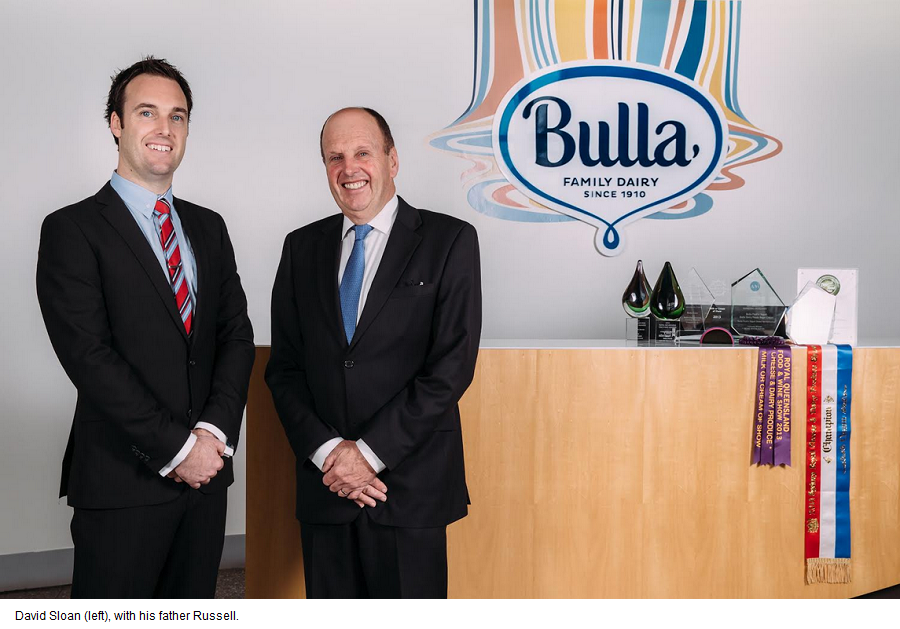A dairy gold mine that's not for sale
There's been a queue of global dairy players and private equity funds forming outside Bulla Dairy Foods' head office in Melbourne's industrial western suburbs for a while now, trying to buy one of Australia's last remaining independent dairy businesses, but they needn't bother.
Bulla is a 100-year-old family business now into its sixth generation, and they're not for selling.
It's owned by not one, but three families, which makes it even more difficult to unlock. One family with a long and proud tradition of generational succession would be hard enough to crack, but getting three to all agree? Forget it.
Bulla is a $450 million a year cream and ice-cream business, with some yoghurt and cottage cheese. It buys 300 million litres of milk equivalent a year, which makes it one of the largest milk buyers in the country, if not the largest.
It is the market leader in cream, with 35 per cent of that market, and supplies about 20 per cent of the nation's ice-cream and “sticks” as they put it (icy-poles to you and me).
And because there are three families involved – the Sloans, the Andersons and the Downeys – it's hard to keep track of how many of them work in the business. It's somewhere between 20 and 25.
Each family has a roughly equal share through a number of family trusts, which historically has been the best way to manage the interests of the 250 family members.
And it would be fair to say that each of them loves being in the business: they get an annual dividend and, until recently, there was a guaranteed job for anyone named Sloan, Anderson or Downey. It was a business that existed for the family, rather than the other way around.
That's now changed to some extent after the last family CEO, Russell Sloan, rewrote the constitution and pushed to be succeeded by Bulla's first non-family CEO.
Reg Weine, the former general manager of sales and marketing, is now in his fourth year as CEO, and everyone is getting used to a different name at the top. But it only came after a long and difficult debate among the directors in 2011.
The board consists of two representatives of each family: Ian and Russell Sloan (Ian is the chairman), Justin and James Downey, Peter Anderson and Denise Fankhauser.
The business began in 1910, when cheesemaker Tom Sloan set up a creamery in his backyard and invented a new way to thicken and sterilize cream.
Cream was very expensive in those days and the business was high margin and very profitable. His brother in law, Hugh Anderson, bought into the business in 1914, making it a two-way partnership, and then in 1918, Hugh's brother Jack bought an equal share with the other two.
Hugh's descendants became the Downeys and they seem to have bred more profusely than the others: there are more Downeys on the very complicated Bulla family tree than any other names, although each family still owns an equal third of the business.
The family constitution that was formalized in 2011 set out for the first time how the company would deal with family job applicants. To paraphrase it: where there are two equal candidates who can't be split, the family member gets preference; otherwise it's on merit.
And young David Sloan, son of the CEO Russell Sloan, was the first scion to feel the brunt of this. At 23, having just finished Uni and worked briefly for Toyota, David showed up to get the job to which he was entitled.
His father, shockingly, sent him away: “I cracked the shits and didn't talk to him for a while,” says David. “I went and got a job as a sales rep at Bonland Dairies (a competitor) and eventually came back with more experience and Dad gave me a job at Bulla in 2008.”

Now David is general manager, commercial sales and marketing, looking after sales outside the grocery channel – which is about 20 per cent of turnover.
The supermarkets, mainly Coles and Woolworths, still represent 80 per cent of Bulla's sales, and as everyone knows, they are very tough customers.
David's job is to increase non-grocery sales, and the company is also focused on exports, which currently represent less than 10 per cent of sales (it's expensive to export cream and ice-cream because cream has to be flown and ice-cream has to be refrigerated).
Of course the cost to a business of having 250 family shareholders who are hungry for dividends and jobs is that it doesn't get the capital, and perhaps the talent, to grow.
That's why private equity and big global firms can pay very fancy multiples for a business like this: they can see the potential for growth and cost savings through pumping in new capital and reforming the staffing and management.
And yes, Bulla has been getting some very fancy offers, but they have never engaged with a bidder and never allowed due diligence.
That's because the Sloans, Andersons and Downeys are very happy with things the way they are.
Says fourth-genner David Sloan: “Money isn't everything.”









